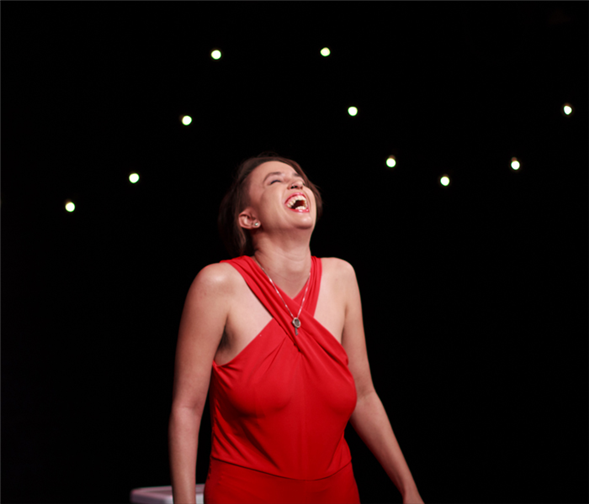Translate Page

In this play, a birth mom tells her story
---
Mother's Day is always an emotional time for playwright and performer Mariah MacCarthy. Every year, she has dinner with a group of birth mothers – meaning women who gave up their children for adoption. "It's one of the most intense things I do all year, every year," she says. "We honor each other, and we share our stories."
MacCarthy's own story is this: at 25 she got pregnant, and at 26, she gave up her son. It's an odyssey she recalls every night in her one-woman show Baby Mama: One Woman's Quest to Give Her Child to Gay People.
The play is running until January 29 at IRT Theater. MacCarthy, who lives in Astoria, has been performing it around the country since 2014, and she will take it to Cincinnati after this engagement. An intensely personal work, Baby Mama chronicles how the then-single MacCarthy became accidentally pregnant, carried her son to term, and saw him adopted by a gay couple.
MacCarthy started writing the play a year after giving birth. The inspiration came from not knowing any birth mothers when she was pregnant, aside from her doula. "It makes sense that I wouldn't know a ton of people who this had happened to," she says. However, she adds, birth mothers "feel this isolation, because we are these unique creatures because we've gone through this highly unusual thing. And none of our cultural conversation about pregnancy and motherhood includes this and makes space for this and accounts for this being a possibility. And that's really lonely."
In recounting her pregnancy, MacCarthy is unabashedly honest. "Having a child is not for the weak of heart!" she says, which is why she details everything from bodily discharges to having sex while expecting. She also uses the show to talk about how expensive motherhood is, which was the primary reason she could not keep her son. She is candid about how in 2012, after having defaulted on two student loans and three credit cards, she was in no position to support a baby.
{Image1}
As she's performed the show, she's discovered that she is not alone: "I've had women say, 'I would've had a baby right now if it weren't for money.' I don't think we're doing enough talking about how not having money keeps women who want kids from having kids."
In speaking of her pregnancy, the conversation inevitably turns political. MacCarthy points out that the United States is the rare developed country that does not have a national paid parental leave law. "It's really sad that in 2017, in America, that you can't even have a child without taking a pay cut, unless your employer is generous," she says. "That's insane to me." That is why, every night after the show, MacCarthy collects donations for a number of different charities for low-income pregnant women, including the Doula Project (which provided MacCarthy with a doula, free of charge), Hour Children, and the GOOD+ Foundation. "In our first weekend, we raised $365 for the Doula Project," she notes. "I'm just so excited about that because I don't think I would have been able to raise that same amount of money by posting about it on Facebook."
When asked if she regrets giving up her son, whose name is Leo, she immediately says, "no." Then she clarifies: "I get sad about it and miss him, but you can regret something and know it was the right thing to do." Plus, MacCarthy sees Leo once a month, as part of what's called an open adoption. He's now four and "really cute."
Still, she says, her son's life is better with three parents instead of one. And that's what MacCarthy wants audiences to realize when they see Baby Mama: that unconventional families are just as legitimate as families with a mother and father. "We don't take good enough care of pregnant women in this country, and we don't make enough space for unconventional families in this country," she says. "I want people to walk away from this being more open minded about what they think family is and what they think pregnancy is and how they talk about those things, and to be more passionate about what the resources are for those people." She pauses, before adding, "I guess the short way of saying that is: to have empathy for this experience."
---
Follow Diep Tran at @DiepThought. Follow TDF at @TDFNYC.
Photos of Mariah MacCarthy in 'Baby Mama' provided by the production.
TDF Members: At press time, discount tickets were available for "Baby Mama." Go here to browse our current offers.